Simplifying with Stoicism: examining negative feelings
| reflectionThe more I can master myself, the less I need, and the freer I am.
I dug into a collection of Epictetus' discourses to learn more about Stoicism. While I've never been much worried about death and I'm unlikely to run into issues with jail, exile, or hemlock (!), I have a lot to learn about dealing with aversion and negative emotions. I live a happier and luckier life than most people do, and I wonder what it would be like with even more understanding.
How can I learn more about this through practice? I can start with negative feelings, then move to attachments, and then get even better at understanding what I do and don't control.
When do I feel negative emotions? What situations disrupt my feelings? Mostly these emotions are directed at things or at myself: frustration with . I'm getting pretty good at not being perturbed by people, even though sometimes other people think I'm annoyed with them when I'm more annoyed with the situation. That said, I'm becoming less inclined to do the emotional work of reassuring people that it's not about them, so sometimes I just take responsibility for what I can control and let them be responsible for their feelings.
Hmm. Frustration and annoyance tend to be outward-directed, while anxiety and embarrassment are internal. I can deal with frustration and annoyance by accepting that the world is what it is. Anxiety can be addressed by faith that things will work out, and embarrassment is just ego in disguise.
So what are those anxieties about, anyway? Let me dig into those further.
Come to think of it, there's not much to be afraid of. I don't have to worry about missing out. Life is pretty darn good even like this, and the rest is icing on the cake. Likewise, I don't have to worry about falling short of expectations, since proper expectations are other people's responsibilities. Messes and mistakes can teach me a lot. As for the fear that pressure or other forces might sway me into making bad decisions… Being able to recognize the warning signs will help me slow down, and mistakes are good for learning anyway.
The fear of falling short is at the root of the impostor syndrome, something I've written about a few times before. I remember reading about the impostor syndrome when I was in school, and recognizing myself in it. You might think that the validation of programming competitions, newspaper articles, and personal projects would boost my belief in myself, but that often made me feel even less like the image I thought people had of me.
But the impostor syndrome, too, might be ego disguised: part desire for validation, part aversion to embarrassment. If I can let go of both, I'll be more free to concentrate on the things worth thinking about, and I can take better risks. So out to the curb they go.
As for the fear of missing out, of not quite doing enough… I've been thinking about how to learn more and how to increase the difference I want to make in this world. In particular, I want to get better at learning from people, which includes learning from coaches. I hear coaches are good for accelerating your growth. I'm careful about how I frame this to myself, because it's much too easy to become unhappy with how you're growing and to want more, more, more.
I realized that I could actually get a pretty good sense of what my life might look like in thirty to forty years, even if I continue in my current trajectory. My parents are in their sixties and I have other mentors around that age, so I know roughly what to expect. Assuming that my skills and tools stay roughly the same, I'm probably going to end up with an even bigger archive of ideas and notes. However, I already know what it's like to have more notes than I can remember and more sketches than I can grasp. Even if I continue with the same strategies, things will probably already be wonderful. If I learn from experience, adapt to the changes in technology and society, and explore new ways of doing things, then it will be even better.
This means that I can probably let go of the fear of missing out, of not living up to my potential or not maximizing awesomeness. Life is already wonderful.
I like thinking through this in advance, when I can reason about them with a clear mind. When situations come up, at least I'll have rehearsed some options. The real tests are when I'm tired or hungry or sleepy, or when something major happens. We'll see. =) In the meantime, it's good to look at the things I might unconsciously avoid looking at, to see what I can do to let them go.

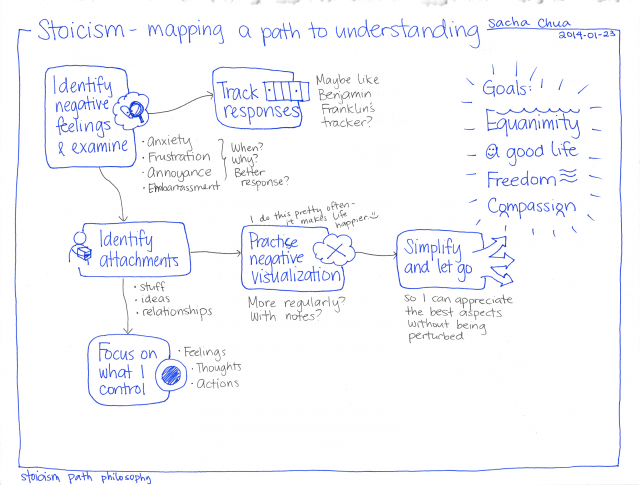
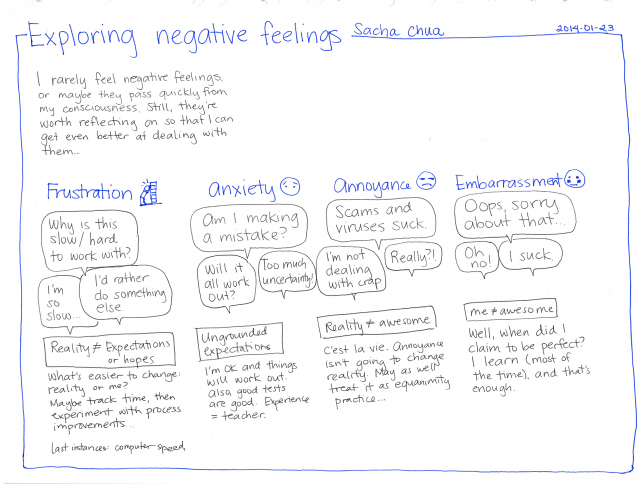
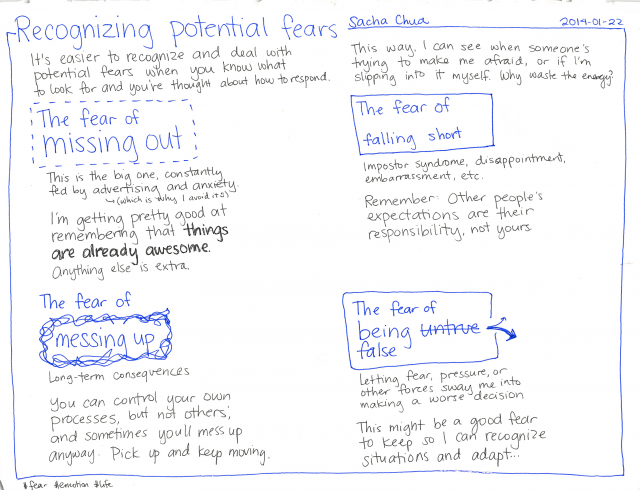
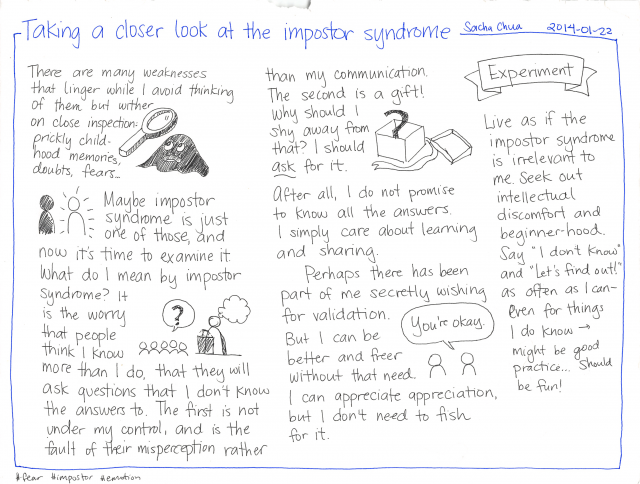
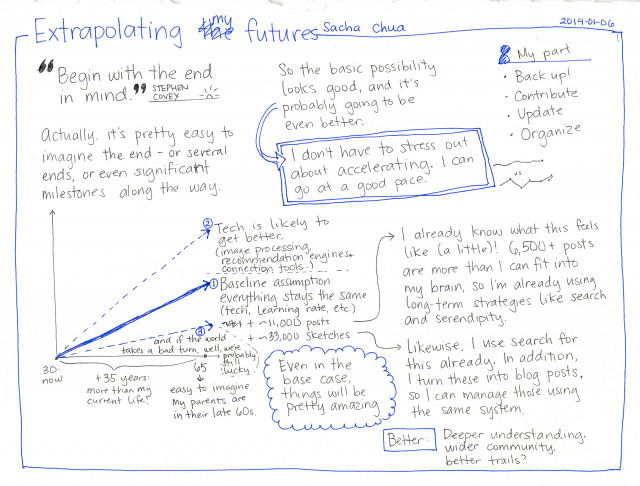
2 comments
benoithamelin
2014-01-25T14:24:11ZI myself have had trouble with mild anxiety, with difficulty dealing with negative emotion, to the point where I did some therapy with a psychologist. I've found two things that really help me deal with the kind of emotions you outlined above.
1. (Re)Defining my sphere of control (not actually a sphere, more like a cloud). Frustration typically comes as something that's not going my way. There are things that I can do about it, and the rest is outside of my sphere of control. Better knowing the contour of this sphere (cloud) makes me feel more focused and more comfortable. This idea largely echoes your second and third panels.
2. Gratitude. You mention that your best approach on your fear of missing out is to remind yourself that things are awesome right now. That works really well for me, especially with difficulties that involve my M- (can I use this nomenclature too? thanks) Forcing myself to make a deliberate gesture of gratitude or to speak "thank you for that" out loud helps me realize not only that my trouble could be worse, but that things are good in and of themselves. I just realized that this is basically praying -- albeit without the baggage. It's good for me. :-)
sachac
2014-01-27T03:32:20ZThanks for sharing!
"Fear of missing out" is a particularly interesting one to recognize because other people are actively trying to get you to feel it, so seeing that for what it is makes it easier to resist advertising. <laugh>
I've still got some unresolved anxiety around shouting which I haven't dealt with, since it never happens in my day-to-day life - just in aggressive training or in tense family situations. I'll get to that someday. =)